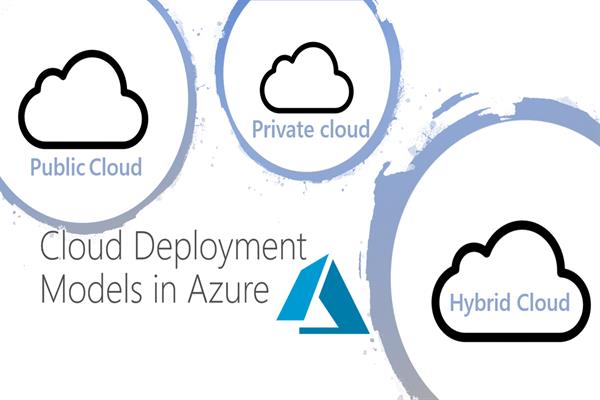Public Cloud vs Private Cloud vs Hybrid Cloud - Cloud Deployment Models In Azure
Cloud Deployment Models In Azure
There are three different cloud deployment models. A cloud deployment model defines where your data is stored and the way your customers interact with it – how do they get thereto, and where do the applications run? It also depends on what proportion of your own infrastructure you would like or must manage.
Explore the three deployment methods of cloud computing
Public Cloud vs Private Cloud vs Hybrid Cloud
Public cloud :
This is the foremost common deployment model. during this case, you've got no local hardware to manage or keep up-to-date – everything runs on your cloud provider's hardware. In some cases, you'll save additional costs by sharing computing resources with other cloud users.
Businesses can utilize multiple public cloud providers of varying scale. Microsoft Azure is an example of a public cloud provider.
Advantages
- High scalability/agility – you do not need to buy a replacement server so as to scale
- Pay-as-you-go pricing – you pay just for what you employ, no CapEx costs
- you are not liable for maintenance or updates of the hardware
- Minimal technical knowledge to line up and use - you'll leverage the talents and expertise of the cloud provider to make sure workloads are secure, safe, and highly available
A common use case scenario is deploying an internet application or a blog site on hardware and resources that are owned by a cloud provider. employing a public cloud during this scenario allows cloud users to urge their website or blog up quickly, then specialize in maintaining the location without having to stress about purchasing, managing, or maintaining the hardware on runs.
Disadvantages
Not all scenarios fit the general public cloud. Here are some disadvantages to think about:
- There could also be specific security requirements that can't be met by using public cloud
- There could also be government policies, industry standards, or legal requirements which public clouds cannot meet
- you do not own the hardware or services and can't manage them as you'll want to
- Unique business requirements, like having to take care of a legacy application could be hard to satisfy
Private cloud :
In a private cloud, you create a cloud environment in your own datacenter and supply self-service access to compute resources to users in your organization. This offers a simulation of a public cloud to your users, but you remain completely liable for the acquisition and maintenance of the hardware and software services you provide.
Advantages
This approach has several advantages:
- you'll make sure the configuration can support any scenario or legacy application
- you've got control (and responsibility) over security
- Private clouds can meet strict security and compliance
Disadvantages
Some reasons teams move far away from the private cloud are:
- you've got some initial CapEx costs and must purchase the hardware for startup and maintenance
- Owning the equipment limits the agility - to scale you want to buy, install, and set up new hardware
- Private clouds require IT skills and expertise that's hard to return by
A use case scenario for a personal cloud would be when a corporation has data that can't be put within the public cloud, perhaps for legal reasons. An example scenario could also be where government policy requires specific data to be kept in-country or privately.
A private cloud can provide cloud functionality to external customers also, or to specific internal departments like Accounting or Human Resources.
Hybrid cloud :
A hybrid cloud combines public and personal clouds, allowing you to run your applications within the most appropriate location. for instance, you'll host an internet site within the public cloud and link it to a highly secure database hosted in your private cloud (or on-premises datacenter).
This is helpful once you have some things that can't be put within the cloud, maybe for legal reasons. for instance, you'll have some specific pieces of knowledge that can't be exposed publicly (such as medical data) which must be held in your private datacenter. Another example is one or more applications that run on old hardware that cannot be updated. during this case, you'll keep the old system running locally, and connect it to the general public cloud for authorization or storage.
Advantages
Some advantages of a hybrid cloud are:
- you'll keep any systems running and accessible that use out-of-date hardware or an out-of-date OS
- you've got flexibility with what you run locally versus within the cloud
- you'll cash in of economies of scale from public cloud providers for services and resources where it's cheaper, then supplement together with your own equipment when it isn't
- you'll use your own equipment to satisfy security, compliance, or legacy scenarios where you would like to completely control the environment
Disadvantages
Some concerns you will need to observe out for are:
- It is often costlier than selecting one deployment model since it involves some CapEx cost upfront
- It is often more complicated to line up and manages





